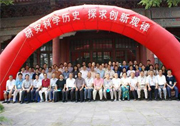| 中文题目: | 也释“白田”兼“水田”——与辛德勇先生商榷 | ||||||
| 英文题目: | |||||||
| 作 者: | 曾雄生 | ||||||
| 刊物名称: | 自然科学史研究 | ||||||
| 发表年度: | 2012 | ||||||
| 卷: | 2012,31 | ||||||
| 期: | (2) | ||||||
| 页码: | 201-208 | ||||||
| 中文摘要: | 该文就辛德勇先生《释“白田”》一文提出商榷,认为白田只是旱田中没有人工灌溉的农田,不是旱田的同义词;另外,空白没有种上庄稼的农田也可以称为白田。同样,唐宋以前的水田也不是单指水稻田,而是指水利田,包括能够得到人工灌溉的旱地。白田和水田的分野是北方水利灌溉事业发展的结果,而与南方的开发无关。 |
||||||
| 英文摘要: | This paper disagrees with prof. Xin Deyong's view on baitian and shuitian, which literally mean the white field and the water field; this paper gives another interpretation of the two words in ancient Chinese documents, and suggests that baitian is a kind of dry land without any artificial irrigation, but not an equivalent of dry-land. Meanwhile it also means bare land including baitian and shuitian that not tilled and occupied by crops and other plants. Similarly, shuitian does not just refer to the paddy field as the times after the Tang and Song dynasties, but to the irrigated field, including some dry land are irrigated in ancient China. The separation of baitian and shuitian was the result of the development of irrigation works and water conservancy in northern China, and has nothing to do with the development of agriculture in southern China as Prof.Xin suggested. |
||||||





